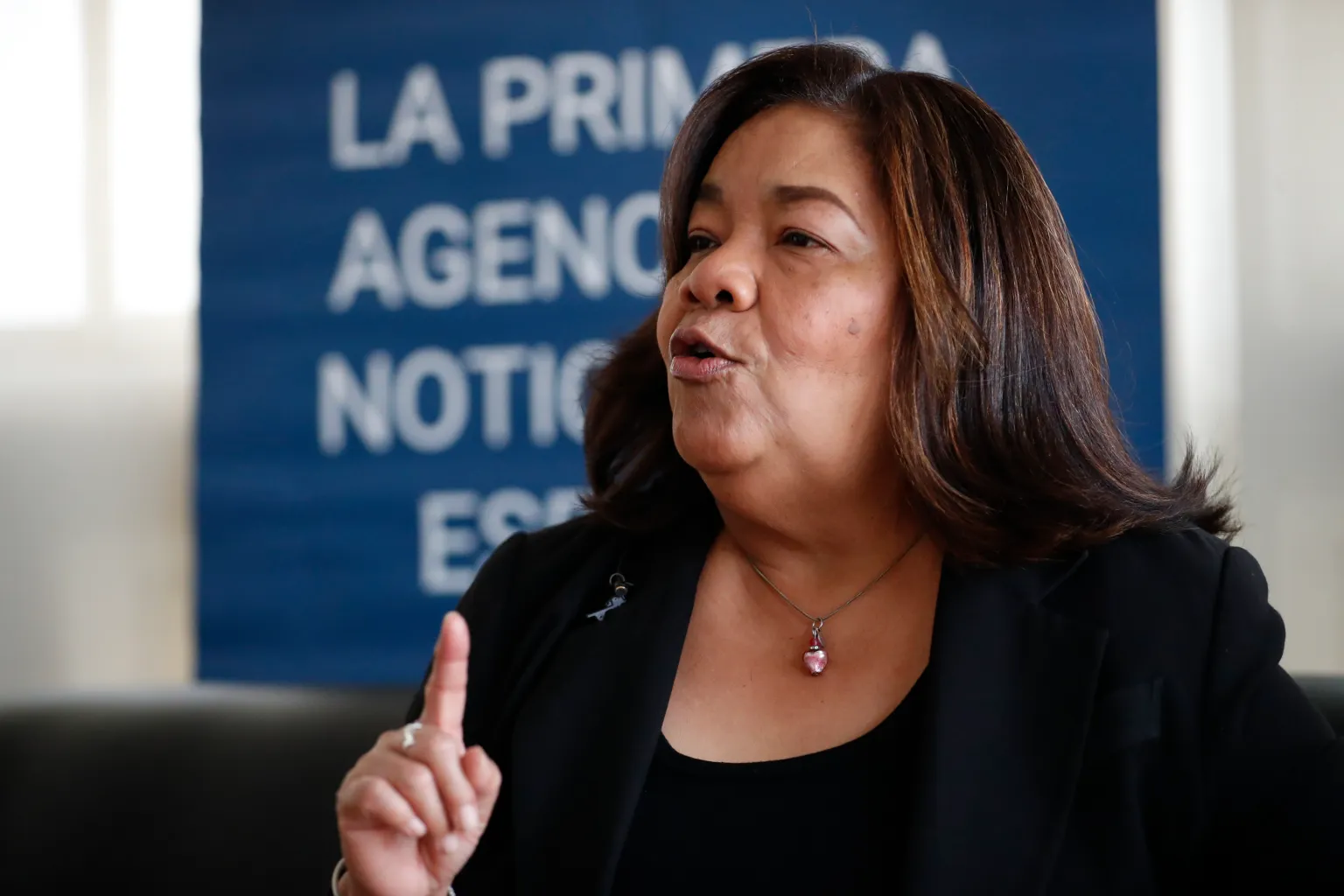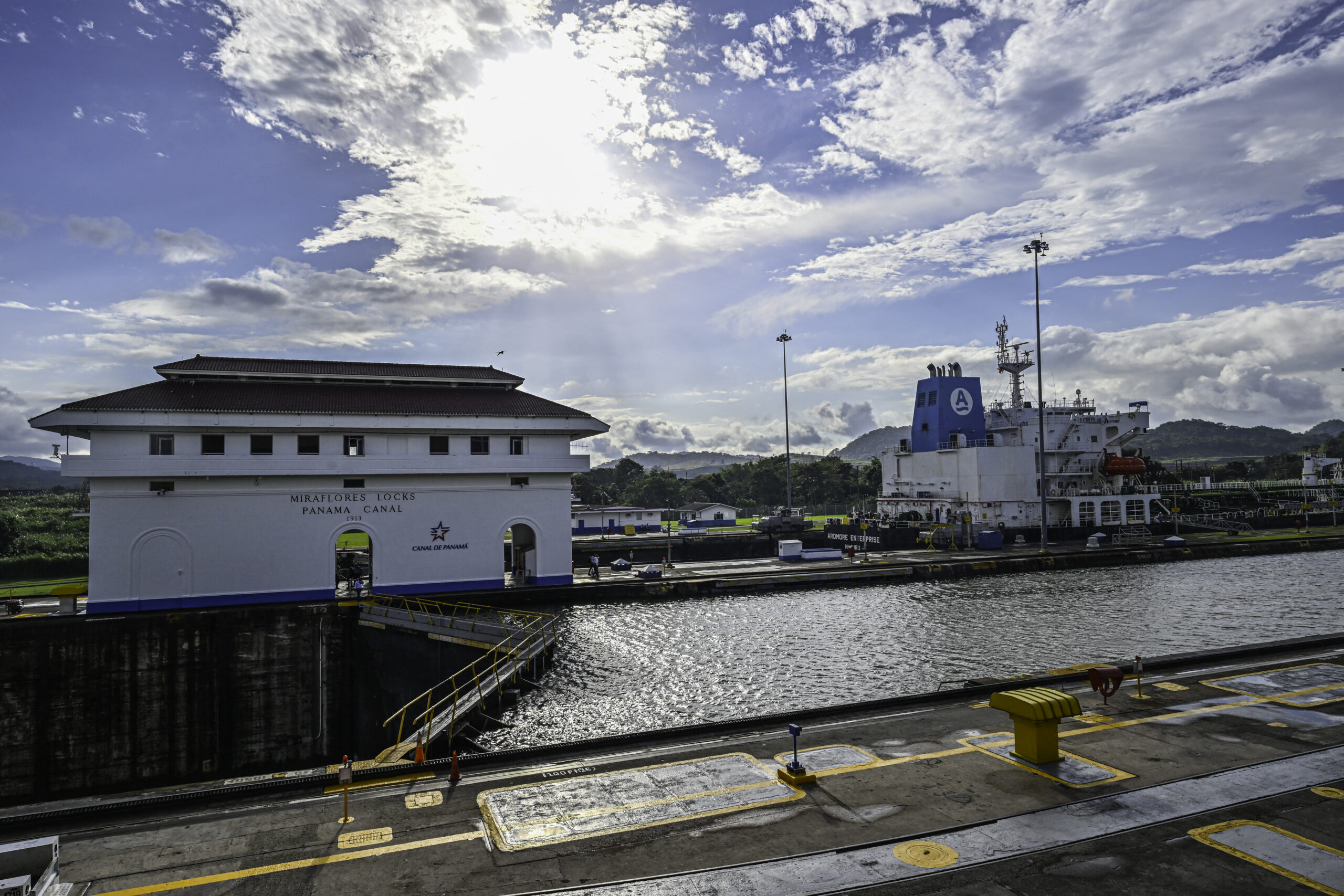Central America
Maribel Gordón, the leftist economist who aspires to the Executive of Panama with a feminist plan

The leftist Maribel Gordón, a professor and economist by profession, aspires to the Presidency of Panama in the elections of next May 5 with a government plan based on social proposals for a “dignified life”, being the only candidate with a plan focused on equality policies.
“That is our approach, which incorporates women in decision-making and my main proposal is a national budget with a gender perspective,” he said in an interview with EFE Gordón, an independent candidate and who is among the last places in all the polls, which he does not recognize and in which he borders on 2% of voting intention.
In the opinion of the candidate, the State approves “dead (and) empty laws” with a gender focus, because they do not have sufficient resources to put them into practice, they only serve to wash the international image, “without any responsibility or will to be executed.”
Gordón, 62 years old and popularly known as ‘La Profe’, is the only candidate with openly socialist ideas and supported by the feminist movement of the Central American country by having a public discourse against sexist violence and equality gaps.
She considered herself part of the feminist revolution from a very early age, when it was still officially chosen who represented the movement. “I joined a group of 14 women who carry out these flags because the gender inequality gaps in Panama are deep.”
He explained that in the country there are “low wages” for women because they are “placed in economic activities where the minimum wage predominates” because “the system does not generate decent employment for women.”
“We are also proposing an institutional policy that guarantees the elimination of violence against women (because) violence begins from the institutional with a State that does not protect and that thinks that if a woman or a teenager is raped is something common or private life,” he said.
The presidential candidate has a long history within the social movements in Panama. He jumped to the public spotlight in the protests against the increase in the price of life in 2021. The prices of gasoline and other commodities skyrocketed due to global inflation.
His interventions – as if he were teaching a university class – during a frustrated dialogue table between the Government and the demonstrations to seek a solution were popularly applauded, thus forging his candidacy with the participation in last year’s anti-mining protests, before which he maintains his resounding “no” to mining in the country.
This is the third time that Gordon tries to reach the spheres of the Executive Power. The previous two times –2014 and 2019 – she was a running mate with the leftist Frente Amplio por la Democracia (FAD). The political arm of the most powerful union in the country and the one that its spectacular failure in the last elections dissolved the party.
Gordón is related to the socio-political movements of the Latin American left. A reflection of this is his Government project baptized as the ‘plan for a dignified life’, which is based on “human well-being”, “real democracy”, the “rescue of identity” and a constitutional reform through the constituent route, one of the two options that the current Magna Carta allows.
“If the left is a failure, why are there economic sanctions against those left-wing countries? (…) (For) the fear of a system that effectively works without blockades (…), at least, on issues of national and social development,” says Gordón.
Thus, he proposes to create in Panama, a country “with its specific characteristics,” a project of “national and social development, that is of the Panamanians and Panamanians for the Panamanians” to which some “examples of other latitudes” can be incorporated.
He also defends that socialism, “that phase of transition between capitalism and communism” that adapts to every historical moment, has tried to “develop” in different ways, so the governments in China, Cuba and Venezuela as well as what “tried to do in Bolivia, Ecuador, Mexico, even today in Colombia and Uruguay” are not alike.
For the elections on May 5, just over 3 million Panamanians are called to the polls.
The main candidates are José Raúl Mulino, the running mate of the disabled former President Ricardo Martinelli, for the Realizing Goals (RM) and Alianza parties. Former President Martín Torrijos (2004-2009), for the Popular Party (PP) and Ricardo Lombana for the Otro Camino Movement.
Central America
Panama Canal Monitoring Trade as Middle East Conflict Disrupts Shipping

The Panama Canal Authority (ACP) said Monday it is closely monitoring global maritime trade developments following the conflict triggered by joint U.S. and Israeli strikes against Iran.
However, the ACP described it as “premature” to predict potential consequences for vessel traffic through the interoceanic waterway, which handles roughly 5% of global maritime trade.
“The Panama Canal continuously monitors the evolution of international maritime trade and the dynamics that may influence its flows,” the authority said in a statement. The canal’s main users are the United States and China, connecting primarily the U.S. East Coast with Asia, including South Korea and Japan.
The ACP emphasized that the canal “continues to operate safely, efficiently, and reliably,” providing uninterrupted service to the global maritime community.
Global Shipping Disruptions
The U.S.-Israeli military operation against Iran and Tehran’s retaliatory actions have disrupted global maritime traffic, particularly oil tanker routes.
Shipping giants Maersk and CMA CGM have suspended transits through the Strait of Hormuz as well as crossings via the Suez Canal, the key route linking the Mediterranean Sea and the Red Sea.
As a result, cargo vessels are now rerouting around Africa to reach Europe from the Middle East and Asia — a detour that adds several thousand kilometers and several days to voyages.
Central America
Washington Imposes Visa Ban on La Modelo Director Amid Crackdown in Nicaragua

The United States government announced Wednesday that it has imposed visa restrictions on Roberto Clemente Guevara Gómez, director of Nicaragua’s largest prison, La Modelo, for his involvement in actions that violate human rights.
In a statement, U.S. Secretary of State Marco Rubio said the measure is intended to promote accountability for abuses committed under what he described as the “Murillo-Ortega dictatorship” against political prisoners.
Rubio specified that Guevara Gómez was designated for participating in “a gross violation of the human rights of a political prisoner.” The sanction was issued under the 2024 Department of State, Foreign Operations, and Related Programs Appropriations Act, which bars the sanctioned individual — and potentially immediate family members — from entering the United States.
“United States demands the immediate and unconditional release of all political prisoners unjustly detained in Nicaragua,” the statement added.
Ongoing tensions between Washington and Managua
Washington rejected Nicaragua’s November 2021 elections, in which President Daniel Ortega and his wife, now co-president Rosario Murillo, were reelected while seven potential challengers were in prison.
Relations between the two countries remain tense amid expanding U.S. sanctions and increasing diplomatic pressure on the Nicaraguan government.
On January 10, marking Ortega’s 19 years in power, Nicaragua released “dozens of detainees,” including political prisoners. The move came one day after the U.S. Embassy in Managua stated that “more than 60 people” remain “unjustly detained or disappeared” in the Central American nation.
U.S. officials have continued to push for the “unconditional release” of political prisoners rather than selective or temporary releases.
Ortega, 80, governs alongside Murillo with consolidated authority, having strengthened executive power through constitutional reforms and security measures, while the opposition has been weakened by imprisonment, exile, and the revocation of citizenship and property rights.
Central America
Guatemala’s Attorney General Consuelo Porras Loses Bid for Constitutional Court Seat

Guatemala’s attorney general, Consuelo Porras, who has been sanctioned by the United States over corruption allegations, lost a key vote on Monday in which a public university selected two of the 10 magistrates for the country’s highest constitutional court. However, she could still seek a seat through another nominating body.
The election of five full magistrates and five alternates to the Corte de Constitucionalidad (CC) is taking place gradually over more than two months and is considered crucial in the ongoing struggle for control of Guatemala’s judiciary, which critics say has long been influenced by a political and economic elite accused of corruption.
According to results announced at a press conference, the governing council of the Universidad de San Carlos de Guatemala (USAC) rejected Porras, who had applied as either a full or alternate magistrate, and instead chose two candidates aligned with the university rector. The vote was held at a hotel in Antigua, about 35 kilometers from the capital.
Despite the setback, Porras — whose term as attorney general ends on May 16 — could still be nominated to the Constitutional Court by the Corte Suprema de Justicia, which appoints two magistrates. The remaining six are selected by the president, the bar association and Congress.
“It’s always a possibility,” the 72-year-old lawyer said days earlier when asked by reporters whether she would seek nomination through another institution if she lost the USAC vote.
Porras has been sanctioned by Washington and the European Union for allegedly attempting two years ago to block the inauguration of President Bernardo Arévalo and for pursuing legal actions against anti-corruption prosecutors, judges, journalists and social leaders since taking office in 2018.
The USAC vote was controversial because most members of the university’s governing council are serving beyond the expiration of their terms. Students, academics and social activists staged protests against Porras’ candidacy.
-

 International4 days ago
International4 days agoCocaine Production Surges 34% in 2023 as Market Expands into Africa and Asia
-

 International3 days ago
International3 days agoTrump Floats “Friendly Takeover” of Cuba Amid Rising Tensions
-

 International1 day ago
International1 day agoIran Reports 201 Dead, 747 Injured After U.S. and Israeli Strikes
-

 International4 days ago
International4 days agoFederal Judge Blocks Trump Policy Allowing Deportations to Third Countries
-

 International3 days ago
International3 days agoArgentina’s Senate Reviews Milei-Backed Labor Overhaul
-

 Sin categoría2 days ago
Sin categoría2 days agoTrump: ‘We Think It’s True’ Amid Claims Iran’s Supreme Leader Was Killed
-

 International2 days ago
International2 days agoSecurity Council to Hold Emergency Meeting on Middle East Crisis
-

 International1 day ago
International1 day agoPope Leo XIV Urges End to ‘Spiral of Violence’ in Middle East
-

 International4 days ago
International4 days agoClinton Accuses Republican Committee of Using Epstein Case to Shield Trump
-

 International1 hour ago
International1 hour agoBrazil’s Supreme Court Rejects Bolsonaro’s Bid for House Arrest
-

 International1 hour ago
International1 hour agoTrump Warns of ‘Major Wave’ of Attacks as Iran Conflict Escalates
-

 International1 hour ago
International1 hour agoAnti-ICE Billboard Campaign Targets Immigration Spending in 31 U.S. Cities
-

 International1 hour ago
International1 hour agoMexico Calls for Immediate Probe After National Dies in ICE Custody
-

 Central America1 hour ago
Central America1 hour agoPanama Canal Monitoring Trade as Middle East Conflict Disrupts Shipping
-

 International1 hour ago
International1 hour agoBolivia Orders Three Investigations Into Deadly Military Plane Crash




























